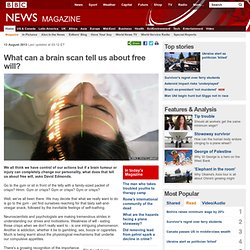

Scientists’ depressing new discovery about the brain. This article originally appeared on Alternet.
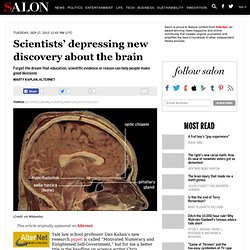
Yale law school professor Dan Kahan’s new research paper is called “Motivated Numeracy and Enlightened Self-Government,” but for me a better title is the headline on science writer Chris Mooney’s piece about it in Grist: “Science Confirms: Politics Wrecks Your Ability to Do Math.” Kahan conducted some ingenious experiments about the impact of political passion on people’s ability to think clearly. His conclusion, in Mooney’s words: partisanship “can even undermine our very basic reasoning skills…. [People] who are otherwise very good at math may totally flunk a problem that they would otherwise probably be able to solve, simply because giving the right answer goes against their political beliefs.”
In other words, say goodnight to the dream that education, journalism, scientific evidence, media literacy or reason can provide the tools and information that people need in order to make good decisions. The answer, basically, is no. Is your brain male or female? 28 September 2014Last updated at 21:02 ET By Dr Michael Mosley BBC Do you have a "male" or "female" brain?
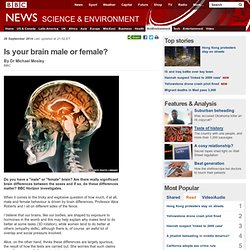
Are there really significant brain differences between the sexes and if so, do these differences matter? BBC Horizon investigates. When it comes to the tricky and explosive question of how much, if at all, male and female behaviour is driven by brain differences, Professor Alice Roberts and I sit on different sides of the fence. Are iPads and tablets bad for young children? Four small preschool children are sitting in a semi-circle around their teacher, in a large, bright room in a Georgian house in Bath.
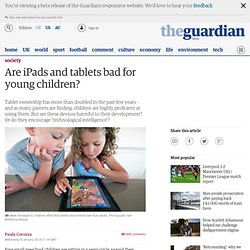
The nursery belongs to the Snapdragons chain, one of the first in the UK to offer iPads to its children soon after the tablet was launched in April 2010. The shelves are full of books, but the children are not looking at books. They are listening to their teacher, Amy Porter, read aloud an interactive story from an iPad about Zub the monster. The children bend towards the screen as if its glow were pulling them closer. They creep forward, the circle tightens and the iPad disappears from view beneath four heads of supremely shiny hair.
Since their launch, tablets have become increasingly popular in preschool and early-years learning. Racing pulse, glowing cheeks and a heavy heart: ‘Body atlas’ heatmaps reveal where we feel different emotions - Science - News. Yet scientists have now discovered that these subjective associations are universal, with the same emotions felt in the same places regardless of where a person is from.

According to a study published in the journal Proceedings of the National Academy of Sciences, such feelings of “somatosensation” could be “at the core of the emotional experience”. A team from the Biomedical Engineering department at Aalto University, Finland, conducted the experiment using more than 700 volunteers from Finland, Sweden and Taiwan. Participants were shown emotional videos, pictures of facial expressions and provocative stories designed to trigger certain feelings.
They were then asked to use computer-generated human silhouettes to map where on their bodies they had felt any stimulus, adding hot or cold colours to show whether “activity” was increasing or decreasing. While changes in the face were linked to many emotions, throat and belly sensations only really appeared in participants feeling disgust.
Newborn babies may be more developed than we think. My baby could not look more like a subject in a laboratory experiment.
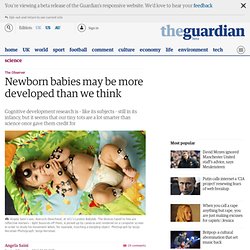
Wearing a soft white skullcap attached by long wires to an EEG machine measuring his brain activity, he is also surrounded by computer equipment and fussing researchers at University College London. "Hopefully you'll be contributing to high-powered science! " one coos at him. Before I'm written off as a bad mother, I should explain: this is the London Babylab, part of UCL's cognitive development research group, which studies how infants perceive the world around them.
The tests aren't uncomfortable, and are supposed to be fun. I have spent hours wondering what he's thinking. But with creative, highly targeted experiments (the key, as any parent knows, is to turn everything into a game) scientists are starting to understand the baby brain. Despite what you've been told, you aren't 'left-brained' or 'right-brained' From self-help and business success books to job applications and smartphone apps, the theory that the different halves of the human brain govern different skills and personality traits is a popular one.
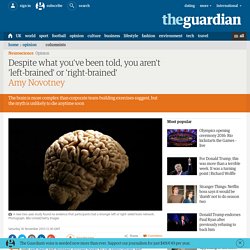
Can you learn how to be a quiz genius? 8 November 2013Last updated at 19:32 ET By Finlo Rohrer BBC News Magazine.

How much can an extra hour's sleep change you? 9 October 2013Last updated at 04:24 ET The average Briton gets six-and-a-half hours' sleep a night, according to the Sleep Council.

Michael Mosley took part in an unusual experiment to see if this is enough. It has been known for some time that the amount of sleep people get has, on average, declined over the years. What can a brain scan tell us about free will? 13 August 2013Last updated at 03:12 ET.
